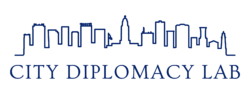This year’s International Biennial of Media Arts (Bains Numériques) hosted by the French city of Enghien-les-Bains focused on the role of digital creativity in building more sustainable urban communities.
The local Centre des Arts (CDA95) partnered up with the City Diplomacy Lab and the French National Research Agency (ANR) to deliver a rich program featuring over 20 events. UNESCO Creative Cities representatives, scholars, and artists offered the public a unique insight into today’s urban transformations and the upcoming urban future.
Highlights

More and more cities worldwide are operating as workshops for participative, innovative, and concrete solutions to today’s major challenges, such as climate change, growing inequalities, and security. City Diplomacy Lab Director Lorenzo Kihlgren Grandi explored the impact and scope of the growing interconnection between these local practices and the emergence of city diplomacy focused on creativity and innovation.
Hiroyuki Suzuki and Makiko Tatsumi presented the Kyoto Arts and Technology Village, a new and innovative space created through a partnership between the Centre des Arts, Kyoto Prefecture, and the Advanced Telecommunications Research Institute International (ATR). They offered insight into this space’s unique strategy of fostering the connection between art and technology within emerging industries.


Representatives of Campina Grande, Namur, and Novi Sad – three UNESCO Creative Cities of Media Arts – shared their experiences and vision of international city-to-city cooperation. This panel offered insight into the shift from a one-way assistance logic to an approach based on a partnership between peers for common goals, in line with the United Nations Agenda 2030.
Gwangju, known as Korea’s City of Light, joined the UNESCO Creative Cities Network in 2014. The city’s commitment to creativity is symbolized by the creation of the Gwangju Media Art Platform (G.MAP), whose task is to “draw of Gwangju’s future with media art.” G.MAP Director Lee Kyungho presented his city’s cultural ecosystem and discussed the role of the new center in making Gwangju a “city of the future.”

The International Biennial of Media Arts was an in-person-only event with English-French simultaneous translation. Free participation upon registration.

